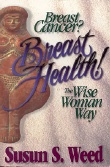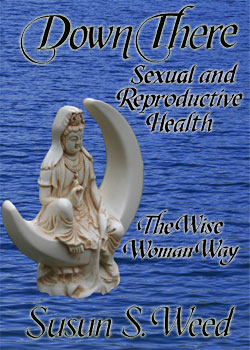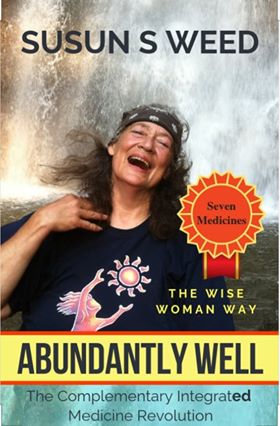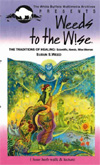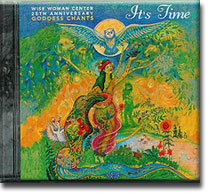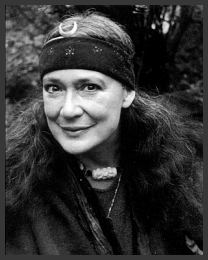www.susunweed.com
Herbal Adventures with Susun S Weed
the Poaceae family - Grasses - the beating heart of life on earth
as seen printed in www.sagewoman.com
The earth offers us so many green blessings: an abundant, overwhelming, brimming basket of beauty, food, and medicine. With so many choices, it's hard to know where to start. Let's learn herbal medicine from the ground up, by focusing on the families of plants.
In previous issues we visited with the mallow family, the knotweed family, the rose family, the aster family (and the genus artemisia), the cabbage family, and the lily family. Altogether, that's more than 30,000 plants we've learned how to identify and use. What's next? The grasses!
A garden catalog (Heronwood) says it poetically: "No wonder visitors feel drawn to the grasses -- we were born in them. Grasses signify water and whisper, 'You're home," more than any other group of plants."
Few people think of grass as a flowering plant; but it is. Many of us think of grass as a lawn or a golf course, not the sacred sustenance of human kind; but it is. Our ancestors had great respect for the grasses. They, in their multitude, are the beating heart of life on earth, the prime mover of agriculture, and the tuning fork of universal nourishment. The grass family -- the Poaceae -- is found in every habitat all over the world, and includes more than 10,000 plants, all of which bear edible seeds.
Grass flowers, it is true, are not fancy. You'll need a magnifying lens to see them clearly . They don't have showy, colorful petals. They just have what's needed: male stamen for pollen, female pistil to capture the pollen and gestate the seed.
And how we value those seeds. Whether it is wheat or rye, oats or barley, corn or millet or rice, almost every person on the planet bases their meals on grain, the seeds of grass. We honor the grain mother whose seeds support our lives: Corn Mother, Ceres (who gives us " cereal"), Demeter, Amaranth Grandmother. Her names are as numerous as Her nourishing seeds, as beautiful as Her seas of golden rippling grass. She sustains us with Her gracious bread of life: mana. "Corn," that is, grain, was the greatest of the Eleusinian mysteries.
"Sedges have edges; rushes run round; grasses have joints," is the saying I learned to help me distinguish between three look-alike plant families. Sedges, fond of wet places, flower from the sides of stalks which have edges. Rushes, also fond of wet places, flower from the top and have round stalks, no edges, like grass. Grasses prefer dry places and flower from the top of round stalks which are jointed, like bamboo, a woody grass. Pluck a flowering stalk of grass and see if you can find the joints. Then, look at the leaves.
Like the lily family, members of the grass family have flat, long, narrow leaves with parallel veins. Unlike lily leaves, grass leaves are micro-serrated along the edge. If you gently pull your fingers up the sides of a grass leaf you'll find it's as sharp as a razor. Careful! It can cut! That's one reason we eat the seeds of the grasses and leave the leaves to the animals (with the exception of those who drink wheat grass, a tasty juice which, unfortunately, lacks value as either a curative or a nutritive).
Sally Fallon, author of Nourishing Traditions Cookbook and advocate of Weston Price, reminds us that grazing animals and grasses benefit each other. It's not a choice between plants and animals, grain or meat. Our planet, and our bodies, need both. Without cattle eating winter wheat shoots, we would lose more than half our grain crops. Why? Because, although grass roots and leaves are extremely cold hardy, the jointed flower/seed stalks are not. Most wheat is sown in the fall, when the soil is drier and easier to work, rather than in the spring when the soil is wet and likely to rot the seeds. If the late fall weather is not cold, however, the grass will start to flower too soon. Pasturing cattle on it prevents this, giving us healthy grass-fed meat and grain to eat as well.
One of my favorite herbs -- oatstraw -- is a grass. Oatstraw is the dried leaves, or straw, of the plant that gives us the grain oats, found in most households as rolled oats. I use a full ounce (by weight) of dried oatstraw, with or without seeds, in a quart of boiling water, steeped at least four hours, to make a restorative tonic. Oatstraw is considered an herb of longevity in India. American herbalists value it as a strengthener and nourisher to the nerves. Like oats themselves, oatstraw infusion is heart healthy and cholesterol-lowering. Many a menopausal woman has praised oatstraw's cooling, calming ways.
There are many stories of grasses. Listen to them; let them take you home. Let them take you back to your Ancestral, sacred self. Herbal medicine is people's medicine, heart medicine -- free, simple, and accessible, a gift of love from our Mother. I'll be back with more plant families and more green blessings. -- soon.
Dear Susun,
My yearly Pap smear shows dysplasia. My doctor says that's a precancerous condition and I need to do something. What?
Sandy
Dear Sandy,
In all likelihood you are fine and your next Pap smear will be normal. Remember that a Pap smear is not a diagnostic test. It is a screening test. About five million American women every year are told that their Pap smear contains abnormal cells (dysplasia), but less than one percent (16,000) are actually diagnosed with cervial cancer. Unfortunately, most of them will be overtreated with procedures that are expensive, painful, damaging, and generally useless.
Unless you have severe dysplasia (CIN-III), you may choose to wait while your cervical cells return to normal. Between 80-99 percent of women with mild to moderate dysplasia, and 50 percent of those with severe dysplasia and carcinoma in situ return to normal without any treatment. Repeated Pap smears every 3-6 months can reassure you and your doctor that your dysplasia is reversing.
Women whose dysplasia advances to cervical cancer are usually malnourished smokers with a history of early and frequent sexual contact with many people. And 95 percent of them are infected with human papilloma virus (HPV), some strains of which cause warts, and some strains of which cause cancer.
HPV is very contagious. It lives in the skin of the genitals as well as in the vagina, penis, anus, and urethra, so condoms can not prevent infection. HPV can live outside the body for up to three days as well; there are substantiated cases of women becoming infected without sexual contact of any kind. Lesbians can get HPV, too, but it is far less common. Nearly all HIV-positive men are infected with anal HPV, and their rates of rectal/anal cancer are high.
A doctor can use a special magnifying instrument to examine your cervix to look for the whitish lesions typical of HPV infection (colposcopy). You can do it yourself at home with a speculum, a mirror, a flashlight, and cotton swabs dipped in white vinegar to paint the cervix so the HPV shows up. Or you can ask that your Pap smear be sent for HPV-DNA analysis.
If your smear does show HPV-DNA, remember, surgery only removes the abnormal cells, not the HPV which remains able to initiate cervical cancer.
A diet rich in carotenes, folic acid, and protein is the best remedy I know for preventing cancer and reversing dysplasia. I get carotenes from cooked sweet potatoes, winter squash, pumpkin, leafy greens, and tomato sauce. I get folic acid from nettle infusion, leafy greens, lentils, beans, seeds, whole grains and nuts. I get protein from organic meat, especially liver, organic milk, yogurt, and cheese, and nourishing herbal infusions such as nettle, oatstraw, red clover..
And, I avoid soy; it may encourage abnormal cell growth by disrupting thyroid functioning. And I let the anti-cancer trio -- red clover, dandelion, and burdock -- as infusions or in tinctures, power up my immunity and help chase away cancer. Chinese herbalists remind us that abnormal cells are overheated and we do well to avoid peppers and hot spices like ginger, cinnamon, cloves, and nutmeg when we have dysplasia.
I repeat, in all likelihood you are fine and your next Pap smear will be normal. Envision it so.
Green blessings, Susun
Susun Weed
PO Box 64
Woodstock, NY 12498
Fax: 1-845-246-8081
Vibrant, passionate, and involved, Susun Weed has garnered an international reputation for her groundbreaking lectures, teachings, and writings on health and nutrition. She challenges conventional medical approaches with humor, insight, and her vast encyclopedic knowledge of herbal medicine. Unabashedly pro-woman, her animated and enthusiastic lectures are engaging and often profoundly provocative.
Susun is one of America's best-known authorities on herbal medicine and natural approaches to women's health. Her four best-selling books are recommended by expert herbalists and well-known physicians and are used and cherished by millions of women around the world. Learn more at www.susunweed.com
For permission to reprint this article, contact us at: www.ashtreepublishing.com/contactVisit Susun Weed at: www.susunweed.com and www.wisewomanbookshop.com
Susun Weed’s books include:
Wise Woman Herbal for the Childbearing Year
Author: Susun S. Weed.
Simple, safe remedies for pregnancy, childbirth, lactation, and newborns. Includes herbs for fertility and birth control. Foreword by Jeannine Parvati Baker. 196 pages, index, illustrations.
Order at: www.wisewomanbookshop.com
Healing Wise
Author: Susun S. Weed.
Superb herbal in the feminine-intuitive mode. Complete instructions for using common plants for food, beauty, medicine, and longevity. Introduction by Jean Houston. 312 pages, index, illustrations.
Order at: www.wisewomanbookshop.com

NEW Menopausal Years the Wise Woman Way
Author: Susun S. Weed.
The best book on menopause is now better. Completely revised with 100 new pages. All the remedies women know and trust plus hundreds of new ones. New sections on thyroid health, fibromyalgia, hairy problems, male menopause, and herbs for women taking hormones. Recommended by Susan Love MD and Christiane Northrup MD. Introduction by Juliette de Bairacli Levy. 304 pages, index, illustrations.
Order at: www.wisewomanbookshop.com
For excerpts visit: www.menopause-metamorphosis.com
Breast Cancer? Breast Health!
Author: Susun S. Weed.
Foods, exercises, and attitudes to keep your breasts healthy. Supportive complimentary medicines to ease side-effects of surgery, radiation, chemotherapy, or tamoxifen. Foreword by Christiane Northrup, M.D. 380 pages, index, illustrations.
Order at: www.wisewomanbookshop.com
Down There: Sexual and Reproductive Health the Wise Woman Way
Publication date: June 21, 2011
Author: Susun S. Weed
Simple, successful, strategies cover the entire range of options -- from mainstream to radical -- to help you choose the best, and the safest, ways to optimize sexual and reproductive health. Foreword: Aviva Romm, MD, midwife, 484 pages, Index, illustrations.
Order at: www.wisewomanbookshop.com
Abundantly Well - Seven Medicines The Complementary Integrated Medical Revolution
Publication date: December 2019
Author: Susun S. Weed
Seven Medicines build foundational health and guide you to the best health care when problems arise. Includes case studies, recipes, exentsive references and resources. Introduction by Patch Adams illustrated by Durga Yael Bernhard 352 pages, index, illustrations
Order at: www.wisewomanbookshop.com
Susun Weed's Video & CD's:Weeds to the Wise DVD Video
Visit Susun's farm for a weed walk. Hear her talk on the Three Traditions of Healing. Make infusion with her. Fun! (1 hour VHS video) Please note: this VHS video tape is in NTSC format which may not be compatible with video players outside of the USA and Canada.
Order at: www.wisewomanbookshop.com
Susun Weed's "It's Time"
Wise Woman Center
25th Anniversary Celebration CD
GODDESS CHANTS CD
Visit www.goddesschants.com to hear all the songs, read lyrics &
learn about the artists.
18 Wise Woman Songs & Chants from the heart
For Wholesale orders see our terms letter or contact us at:
Ash Tree Publishing PO Box 64 Woodstock, NY 12498 ~
Website: www.wisewomanbookshop.com ~
Susun Weed, green witch and wise woman, is an extraordinary teacher with a joyous spirit, a powerful presence, and an encyclopedic knowledge of herbs and health. She is the voice of the Wise Woman Way, where common weeds, simple ceremony, and compassionate listening support and nourish health/wholeness/holiness. She has opened hearts to the magic and medicine of the green nations for decades. Ms. Weed's Six herbal medicine books focus on women's health topics including: menopause, childbearing, and breast health. Visit her site www.susunweed.com for information on her workshops, apprenticeships, correspondence courses and more! Venture into the Menopause site www.menopause-metamorphosis.com to learn all about the Menopausal Years the Wise Woman Way.
Join Susuns Mentorship site for personal one on one mentorship! We also invite you to visit our commerce site www.wisewomanbookshop.com to learn about our Wise Woman publications, workshops, correspondence courses. As well as online courses at Wise Woman School.
back to articles index
back to press kit
© Susun Weed -Wise Woman Center
~ Disclaimer & Privacy Policy ~


